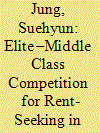| Srl | Item |
| 1 |
ID:
185895


|
|
|
|
|
| Summary/Abstract |
This paper examines the anti-corruption movement initiated by Kim Jong Un, focusing on the increased rent-seeking competition between the elite and the middle class as market mechanisms have developed in North Korea. I examine two hypotheses regarding this program. First, it is focused on constraining the influence gained by the elite through power–money collusion to maintain regime stability. Second, it aims to support decentralizing economic reforms and the direction of production surplus into state finances, to secure state revenue. In substantiating these hypotheses, I argue that the movement is driven by the goal of capitalizing on the benefits of the market without compromising regime security, by regulating “competitive rent-seeking” between the elite and the middle class.
|
|
|
|
|
|
|
|
|
|
|
|
|
|
|
|
| 2 |
ID:
187976


|
|
|
|
|
| Summary/Abstract |
This article examines the sources of corruption in authoritarian regimes, focusing on the effect of time variance on the level of corruption, personalist concentration of power, and the regime stability (ruler’s expectations for remaining in power). The Personalism Index developed by J. Wright and the Varieties of Democracy (V-Dem) Corruption Index were used in order to construct the panel data covering 2001–2010 for fifty-eight authoritarian states. The empirical findings show that authoritarian regimes with a higher personalist concentration are more prone to corruption, and that short sighted and vulnerable authoritarian regimes are more corrupt. From a policy perspective, the results suggest that reinforcing institutions which can impose political restrictions on top leaders from arbitrarily allocating resources via rent-seeking can be effective in curbing corruption in authoritarian regimes. On the other hand, the results also indicate that an authoritarian leader with longer time horizon can implement the institutions which can improve economic performance, thus leading to lower levels of corruption.
|
|
|
|
|
|
|
|
|
|
|
|
|
|
|
|